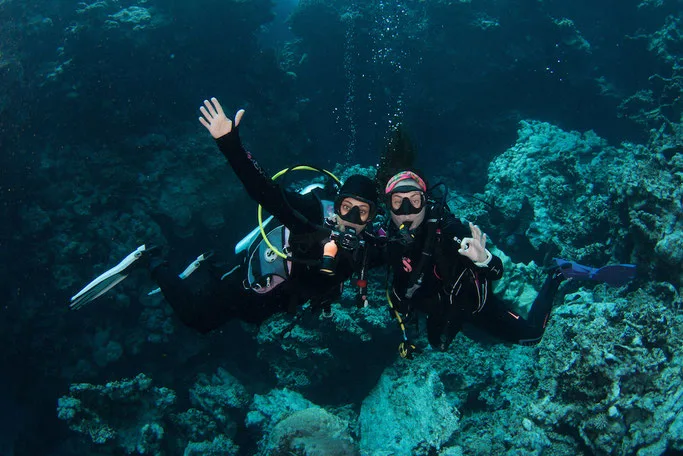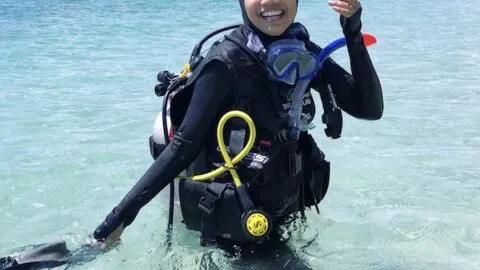Anxiety in scuba diving, or in every day life, is a psychological state that can cause emotional and physical symptoms which can range from a quickened heartbeat to the paralyzing feelings of a panic attack. Recent evidence suggests that individuals who generally have higher levels of anxiety in their day-to-day life, are at an even higher risk of experiencing anxiety or panic underwater.
Just as it is important to know how to respond in an underwater emergency, it is also crucial to be aware of underwater anxiety and how to react if you or your dive buddy experience it. There are a few ways you can effectively work through anxiety underwater and prevent it from occurring in the first place. We talk to GTS contributor Stephanie Huff to find out more.
Prevention
1. Avoid alcohol or caffeine:
Alcohol is a depressant and its consumption has been correlated to mood disorders; this is the reason you may sometimes feel the ‘booze blues’ after a night of binge drinking. Though it is never a good idea to drink before diving, even a few drinks the night before a dive can stimulate feelings of anxiety the following day.
Caffeine on the other hand is a stimulant, which can be a huge trigger for anxious feelings. Try skipping your morning coffee or tea before a dive if you are concerned about underwater anxiety.
2. Never dive beyond your skill level:
This one may seem obvious, but not all dive shops operate to the same industry standards. For example, some shops may take you to a maximum depth that is beyond your training, or prolong the ascent until there is minimum air left in the tank. These situations can be a huge source of anxiety for novice divers, therefore it is important to not just passively trust a dive shop. Be aware of your skills and comfort level and ensure they match the planned dive site before getting in the water.
3. Practice your skills:
According to DAN, as stress increases, a diver’s ability to recognize and respond appropriately in an emergency situation decreases. It is critical for the diver to recognize the signs of stress before it reaches panic. As a preventative measure of underwater anxiety, a solid understanding of safety procedures and the dive plan can ward of feelings of unease.
Having the appropriate training and skillset for the depth and type of dive you are doing is key in feeling confident and comfortable under water. If you feel nervous before entering the water, you may want to ensure you master all of your skills in shallow water or a pool first. For example, many divers feel uncomfortable flooding and clearing their mask or taking out their regulator. These are vital skills to master before doing an open water dive, so you can react without panic if your mask falls off or you need to switch regulators during an emergency.
4. Visualize potential problems and solutions:
Doing your homework on specific aspects of diving that make you nervous is a great way to further master your skills. For example, if you are anxious about flooding your mask, you might consider practicing in a bath tub or the shallow end of a pool where you will feel stable. If you are fearful of spotting a shark, you may want to read up about the local species to clarify any misconceptions or false beliefs. Being informed and prepared for how to react in situations that make you nervous before getting in the water, can decrease the risk of panic during a dive and allow you to enjoy the experience.
5. Honest Communication:
Open and honest communication with your dive buddy and dive master or instructor surrounding any concerns of underwater anxiety is important. You should not feel ashamed to discuss this because a conversation about underwater anxiety before getting in the water can make the dive safer for everyone involved. You will have the opportunity to voice any anxiety-provoking questions or scenarios that are on your mind, and the dive master or instructor will be aware of your concerns and check in with you more frequently throughout the dive.

Management
If the above preventative strategies don’t work and you find yourself feeling the tell-tale signs of anxiety underwater, you can try these management tools.
1. Positive self-talk
Essentially you will be talking yourself through the anxiety. If you feel anxious underwater, give yourself compassionate and kind thoughts. Remind yourself that you are safe and in control of the situation. Tell yourself that you are strong and adventurous and you can do it. Notice your surroundings and remind yourself of how amazing it is to be underwater!
2. Analyze what is making you anxious
Along with talking yourself through an anxious situation, you might want to analyze what is triggering your anxiety. Do a body scan and note if you are holding any tension. Are you biting down on your regulator or clenching your hands? Is your mask leaking? Did you see an unfamiliar marine species that may have triggered anxiety? Are you cold? Figuring out if there is something specific triggering your anxious feelings is a fast way to stop it in its tracks.
3. Focus on your breath
One of the most powerful things you can do while scuba diving is to control your breath. Not only is it important for buoyancy, but you can use it to stay calm. Just like you would breath in yoga, remind yourself to focus on your inhalations and exhalations, breathing slowly and intentionally. This will decrease your heart and respiration rates, and calm feelings of panic.
Take home
Anxiety does not have to negatively impact your scuba diving. Though implementing the above prevention and management strategies, you may find that your dives are more calm, enjoyable and safe!

About the Author
Steph is a Canadian blogger and freelance writer with a passion for travel, adventure and all things pink. You can find her writing and photography on her blog, www.thepinkbackpack.com.

